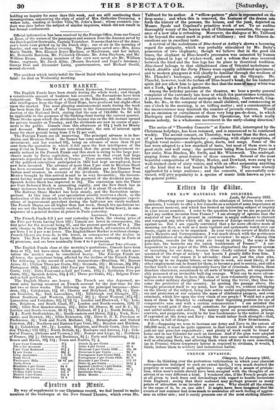ultras to 14t alba.
THE RAW MATERIAL FOR SOLDIERS.
Leeds, 3d January 1852.
Sin.—Observing your impartiality in the admission of letters from corre- spondents, 1 venture to offer a few remarks on a subject of some importance at the present moment, and which has formed an interesting subject of inquiry in your recent numbers. I refer to the question how far we are prepared to repel any sudden invasion from France ? I am strongly of opinion that the material of our Navy at present in existence is amply sufficient to obstruct and vanquish any force which all the powers of Europe united could bring against us. But I am equally convinced that a far more effective mode of manning our fleet, as well as a more vigilant and systematic watch over our coasts, ought at once to be organized. In your verynble review of Mallet du Pan's Memoirs and Correspondence, I was much struck with the pertinence and truthfulness of an observation of your reviewer : he says—" Among this population, recruits for the army are found in plenty the army is the poor-law, the barracks are the union workhouses of France." A cor- respondent in our paper of the 20th ultimo stigmatized the present system of recruiting for our Army, because those chiefly enlisted .tuto the ranks consisted of the dregs of society : but herein I greatly differ from him. I think for that very reason it is advisable : these are just the class who, brought up to no regular labour, or too idle to work, are most likely, if no other employment can be found for them, to become a pest to society, and add a further batch to our already deplorably heavy list of criminals. Besides, these dissolute characters, accustomed to all sorts of brutal sports, are unquestion- ably possessed of an invincible bull-dog courage. What can be more advan- tageous to society than to have this class of men voluntarily placing them- selves under military discipline ? Instead of being the terror, they thus be- come the protectors of the country. In quoting the passage above, the thought presented itself to my mind, how far could we, without infringing on the liberty of the subject, bring into active useful employment as defend- ers and protectors of our country the mass of ablebodied paupers, and even criminals, which live upon the very vitals of our people ? Would not a great mass of these be thankful to exchange their degrading position for one of comparative ease and with a certain remuneration ? I am satisfied the country would gain if they could substitute for paupers and criminals good and useful soldiers and sailors. The money spent on prosecutions, prisons, convicts, and pauperism, would be far less burdensome to the nation at large if expended on the Army and Navy : this would infuse fresh strength—that, we know, is full of danger. A. Nxw SUBSCRIBER. P.S.—Supposing we were to increase our Army and Navy to the extent of 100,000 men, it must be quite apparent to that extent it would relieve our hudicial and poor-law expenditure ; and plenty of work could be found at ome and in our Colonies for such an increase. And if the plan were adopted in the Army and Navy too, of teaching the men some useful occupation, as well as educating them, and allowing them when off duty to earn something (as in Prussia) where temporary labour is required by civilians, it would, I think, induce them to sobriety and industrious habits.


























 Previous page
Previous page